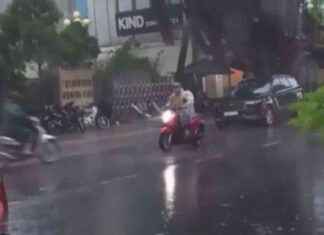Anatoly Maïstrenko and Antonina Voïtsechko cannot explain how they managed to survive.
In more than six months, under the nose and beard of the Moscow army, they say they have helped 2,200 people to flee the occupier by crossing the Ingulets river which cuts Arkhangelské, their town in the Ukrainian region of Kherson.
“God spared us,” said Anatoly Maystrenko, 63, glancing up at the sky.
Around him, the vestiges of fighting remain visible almost everywhere, a month after the departure of the forces from Moscow, driven out by the Ukrainian counter-offensive.
Bloody Russian uniforms still litter the ground in places and the smell of corpses escapes from the garages bordering the rutted sidewalks. In the distance, deaf sounds of explosions resonate at regular intervals.
– “They must have seen us” –
As early as April, only a few weeks after the capture of the region by the Russian army, Antonina Voitsechko, 59, gathered residents of the surrounding hamlets to bring them in small groups to a secret meeting place, located near the Ingulets river.
There, her new husband, Anatoliï, was waiting for them, installing these displaced persons in an inflatable boat. By force of arms, he then moved people from the territories occupied by the Russian army to those under the control of kyiv.
“The shells fell on the shore while we were still in the water. We experienced all the possible adventures,” he told AFP.
On the way back, he sometimes embarked with him, he says, teams of saboteurs from the Ukrainian army, or even intelligence men.
“The Russians didn’t allow cars to leave (the village) but they strangely allowed us to go towards the river,” Antonina told AFP.
“We still don’t know” why the Russians let it happen, she continues. “They must have seen us. They were watching us all the time.”
Then, in the fall, the Ukrainian counter-offensive in the north of the Kherson region towards the Ingulets forced the Russian soldiers to withdraw to the south, a new setback for Moscow which had just lost thousands of km2 of ground. in the northeast of the country.
On October 3, Arkhangelské was liberated, pinning the Russian forces between two rivers, the Ingulets and the Dnieper River. At the same time, another Ukrainian push continues from the West, threatening the Russian occupation of the regional capital, Kherson, the largest city captured by Moscow since the start of the invasion.
– “My children” –
Tamara Propokiv, 59, says she gave the couple of smugglers her two daughters to escape the occupied zone.
She herself remained in her village of Vysokopillia, where she has a store. Here, despite the departure of the Russians, the streets are still dangerous, with mines and traps still numerous. The army said 12 civilians had been hospitalized over the past week, injured by hidden explosive devices. At least one person was killed.
The Russians, “you were nothing to them and they were the bosses,” Tamara recalls.
“They never hurt me or beat me up. But they also never offered something to eat when I was hungry,” she adds, when asked about life under the occupation.
When, after months of occupation, a neighbor tells her that the Ukrainian army is back, Tamara is stunned.
“The soldiers hugged me so tightly that I felt like they were my children,” she said, tears in her eyes.








